Work in Global Society: Analyzing Concepts Through Answers and Essays
VerifiedAdded on 2020/05/03
|18
|6229
|199
Homework Assignment
AI Summary
This document presents a comprehensive solution to a 'Work in Global Society' assignment. It begins with Section A, which provides concise answers to short answer questions, defining and discussing the implications of concepts such as offshoring, technical and non-technical skills, deindustrialization, technical determinism, technocracy, moral economy, the gig economy, the precariat, Labour Process Theory, flexible firms, neo-liberalism, voluntary codes of conduct, and international labor standards. Each answer explains how the concept aids in understanding the evolving nature of work in a globalized context. Section B then delves into essay questions, allowing for a deeper analysis of the topics covered in Section A. The assignment explores the multifaceted dimensions of work, incorporating economic, social, and technological factors. The references section provides a list of sources used in the assignment.
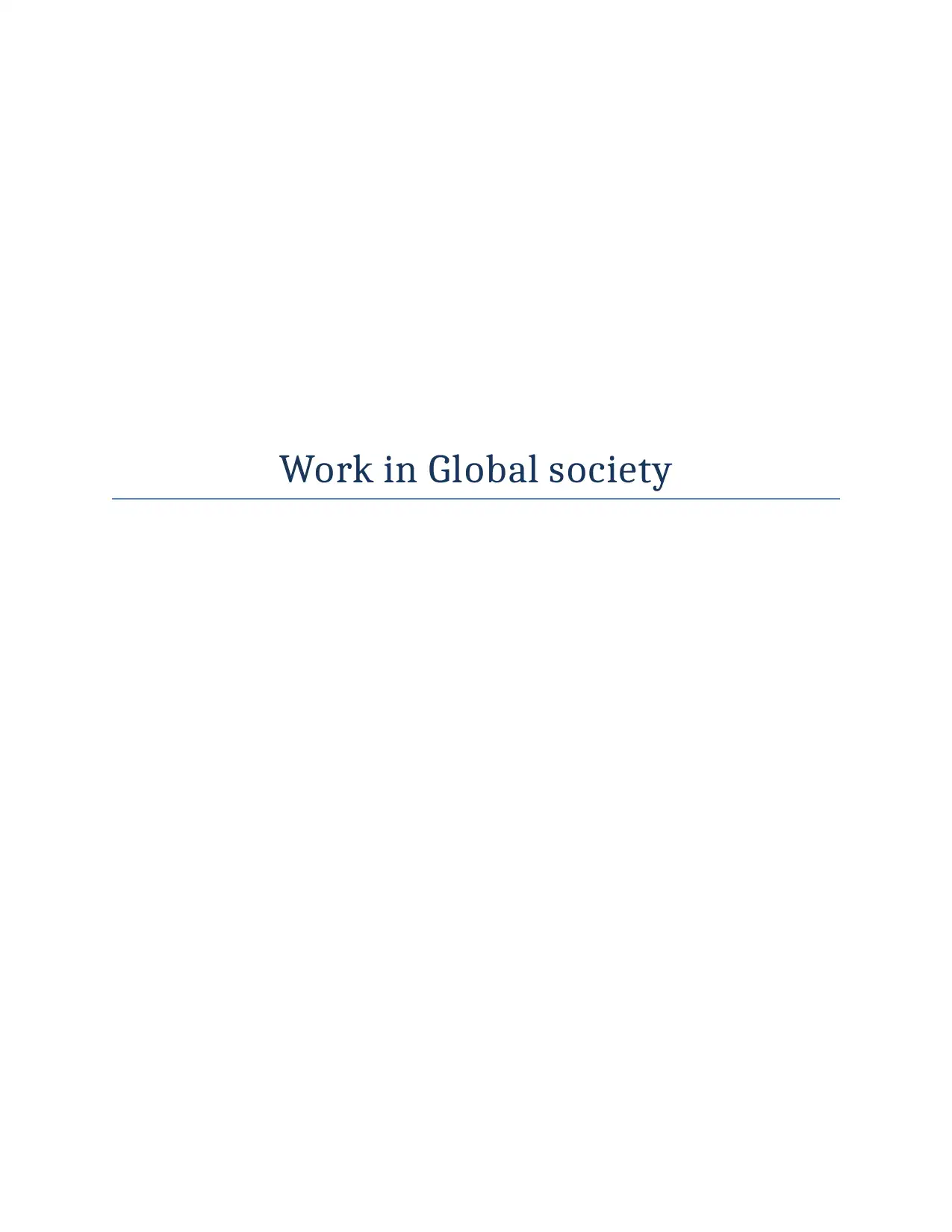
Work in Global society
Paraphrase This Document
Need a fresh take? Get an instant paraphrase of this document with our AI Paraphraser
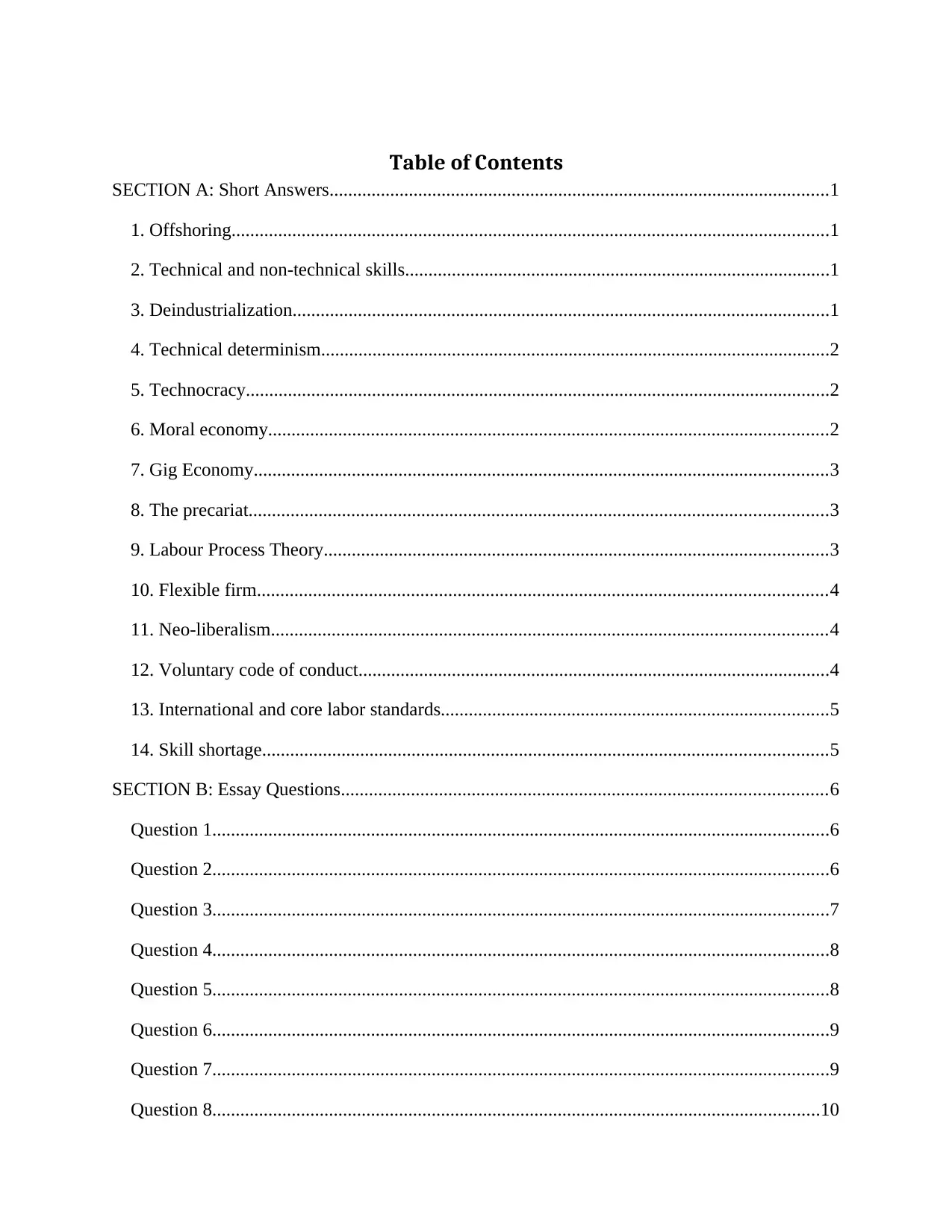
Table of Contents
SECTION A: Short Answers...........................................................................................................1
1. Offshoring................................................................................................................................1
2. Technical and non-technical skills...........................................................................................1
3. Deindustrialization...................................................................................................................1
4. Technical determinism.............................................................................................................2
5. Technocracy.............................................................................................................................2
6. Moral economy........................................................................................................................2
7. Gig Economy...........................................................................................................................3
8. The precariat............................................................................................................................3
9. Labour Process Theory............................................................................................................3
10. Flexible firm..........................................................................................................................4
11. Neo-liberalism.......................................................................................................................4
12. Voluntary code of conduct.....................................................................................................4
13. International and core labor standards...................................................................................5
14. Skill shortage.........................................................................................................................5
SECTION B: Essay Questions........................................................................................................6
Question 1....................................................................................................................................6
Question 2....................................................................................................................................6
Question 3....................................................................................................................................7
Question 4....................................................................................................................................8
Question 5....................................................................................................................................8
Question 6....................................................................................................................................9
Question 7....................................................................................................................................9
Question 8..................................................................................................................................10
SECTION A: Short Answers...........................................................................................................1
1. Offshoring................................................................................................................................1
2. Technical and non-technical skills...........................................................................................1
3. Deindustrialization...................................................................................................................1
4. Technical determinism.............................................................................................................2
5. Technocracy.............................................................................................................................2
6. Moral economy........................................................................................................................2
7. Gig Economy...........................................................................................................................3
8. The precariat............................................................................................................................3
9. Labour Process Theory............................................................................................................3
10. Flexible firm..........................................................................................................................4
11. Neo-liberalism.......................................................................................................................4
12. Voluntary code of conduct.....................................................................................................4
13. International and core labor standards...................................................................................5
14. Skill shortage.........................................................................................................................5
SECTION B: Essay Questions........................................................................................................6
Question 1....................................................................................................................................6
Question 2....................................................................................................................................6
Question 3....................................................................................................................................7
Question 4....................................................................................................................................8
Question 5....................................................................................................................................8
Question 6....................................................................................................................................9
Question 7....................................................................................................................................9
Question 8..................................................................................................................................10

Question 9..................................................................................................................................11
Question 10................................................................................................................................11
REFERENCES..............................................................................................................................13
Question 10................................................................................................................................11
REFERENCES..............................................................................................................................13
⊘ This is a preview!⊘
Do you want full access?
Subscribe today to unlock all pages.

Trusted by 1+ million students worldwide
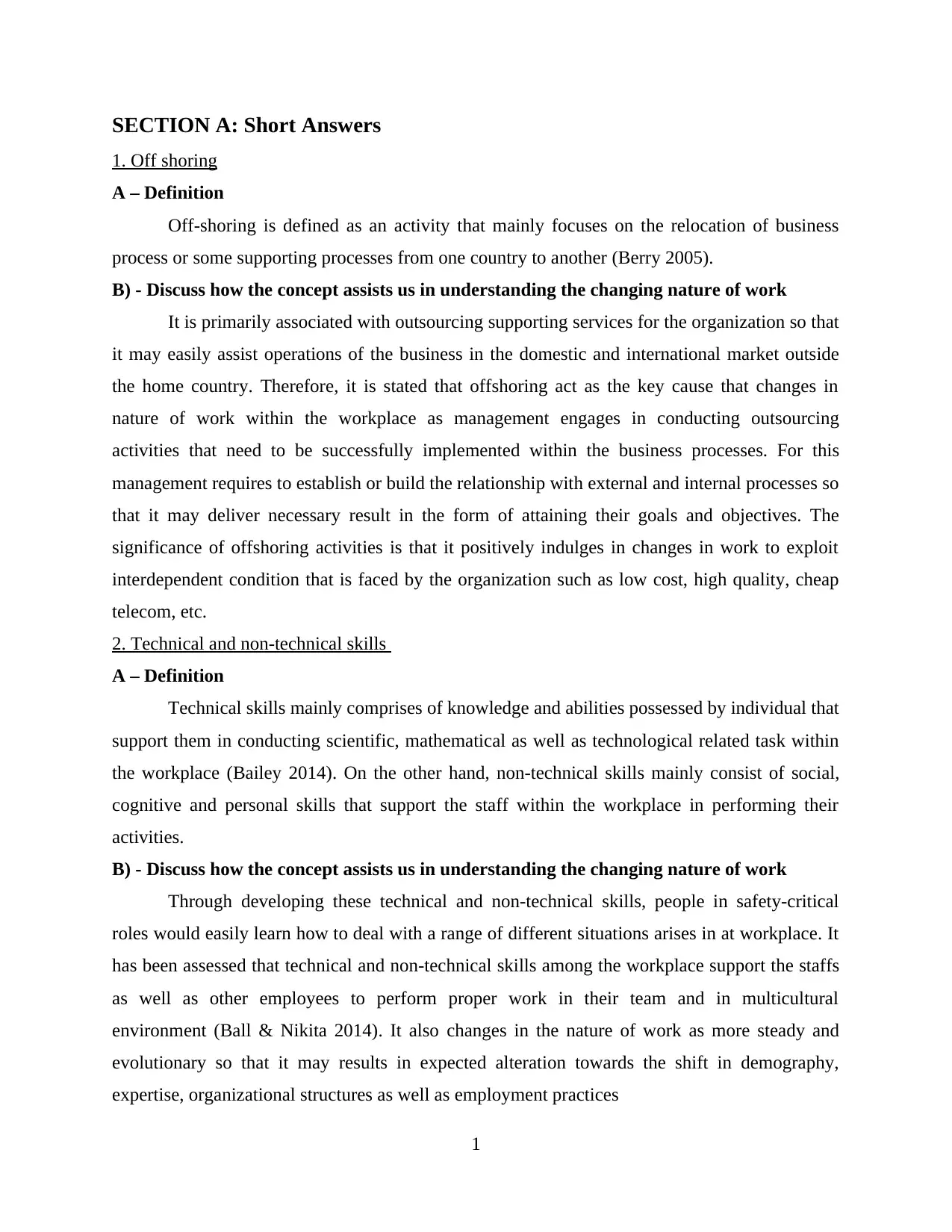
SECTION A: Short Answers
1. Off shoring
A – Definition
Off-shoring is defined as an activity that mainly focuses on the relocation of business
process or some supporting processes from one country to another (Berry 2005).
B) - Discuss how the concept assists us in understanding the changing nature of work
It is primarily associated with outsourcing supporting services for the organization so that
it may easily assist operations of the business in the domestic and international market outside
the home country. Therefore, it is stated that offshoring act as the key cause that changes in
nature of work within the workplace as management engages in conducting outsourcing
activities that need to be successfully implemented within the business processes. For this
management requires to establish or build the relationship with external and internal processes so
that it may deliver necessary result in the form of attaining their goals and objectives. The
significance of offshoring activities is that it positively indulges in changes in work to exploit
interdependent condition that is faced by the organization such as low cost, high quality, cheap
telecom, etc.
2. Technical and non-technical skills
A – Definition
Technical skills mainly comprises of knowledge and abilities possessed by individual that
support them in conducting scientific, mathematical as well as technological related task within
the workplace (Bailey 2014). On the other hand, non-technical skills mainly consist of social,
cognitive and personal skills that support the staff within the workplace in performing their
activities.
B) - Discuss how the concept assists us in understanding the changing nature of work
Through developing these technical and non-technical skills, people in safety-critical
roles would easily learn how to deal with a range of different situations arises in at workplace. It
has been assessed that technical and non-technical skills among the workplace support the staffs
as well as other employees to perform proper work in their team and in multicultural
environment (Ball & Nikita 2014). It also changes in the nature of work as more steady and
evolutionary so that it may results in expected alteration towards the shift in demography,
expertise, organizational structures as well as employment practices
1
1. Off shoring
A – Definition
Off-shoring is defined as an activity that mainly focuses on the relocation of business
process or some supporting processes from one country to another (Berry 2005).
B) - Discuss how the concept assists us in understanding the changing nature of work
It is primarily associated with outsourcing supporting services for the organization so that
it may easily assist operations of the business in the domestic and international market outside
the home country. Therefore, it is stated that offshoring act as the key cause that changes in
nature of work within the workplace as management engages in conducting outsourcing
activities that need to be successfully implemented within the business processes. For this
management requires to establish or build the relationship with external and internal processes so
that it may deliver necessary result in the form of attaining their goals and objectives. The
significance of offshoring activities is that it positively indulges in changes in work to exploit
interdependent condition that is faced by the organization such as low cost, high quality, cheap
telecom, etc.
2. Technical and non-technical skills
A – Definition
Technical skills mainly comprises of knowledge and abilities possessed by individual that
support them in conducting scientific, mathematical as well as technological related task within
the workplace (Bailey 2014). On the other hand, non-technical skills mainly consist of social,
cognitive and personal skills that support the staff within the workplace in performing their
activities.
B) - Discuss how the concept assists us in understanding the changing nature of work
Through developing these technical and non-technical skills, people in safety-critical
roles would easily learn how to deal with a range of different situations arises in at workplace. It
has been assessed that technical and non-technical skills among the workplace support the staffs
as well as other employees to perform proper work in their team and in multicultural
environment (Ball & Nikita 2014). It also changes in the nature of work as more steady and
evolutionary so that it may results in expected alteration towards the shift in demography,
expertise, organizational structures as well as employment practices
1
Paraphrase This Document
Need a fresh take? Get an instant paraphrase of this document with our AI Paraphraser
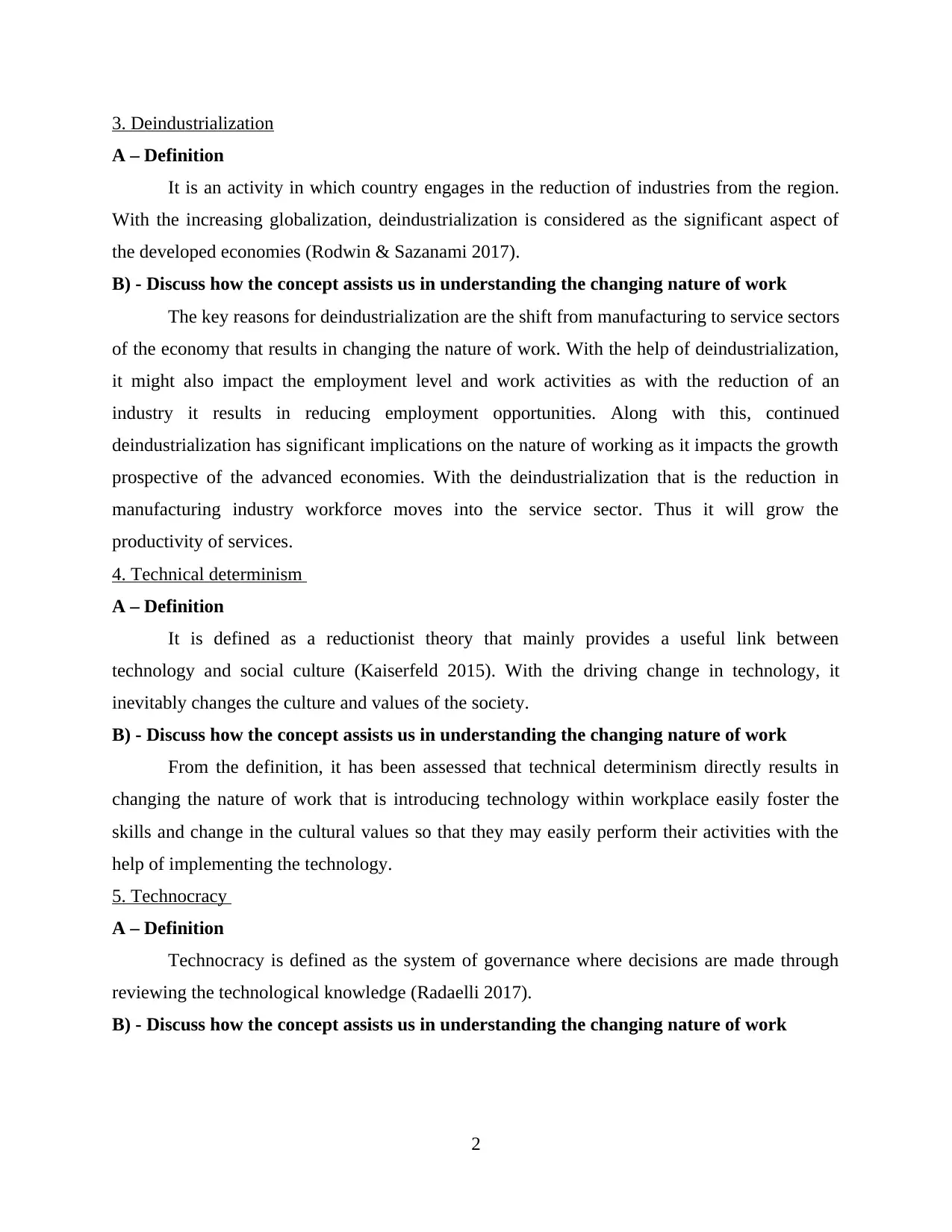
3. Deindustrialization
A – Definition
It is an activity in which country engages in the reduction of industries from the region.
With the increasing globalization, deindustrialization is considered as the significant aspect of
the developed economies (Rodwin & Sazanami 2017).
B) - Discuss how the concept assists us in understanding the changing nature of work
The key reasons for deindustrialization are the shift from manufacturing to service sectors
of the economy that results in changing the nature of work. With the help of deindustrialization,
it might also impact the employment level and work activities as with the reduction of an
industry it results in reducing employment opportunities. Along with this, continued
deindustrialization has significant implications on the nature of working as it impacts the growth
prospective of the advanced economies. With the deindustrialization that is the reduction in
manufacturing industry workforce moves into the service sector. Thus it will grow the
productivity of services.
4. Technical determinism
A – Definition
It is defined as a reductionist theory that mainly provides a useful link between
technology and social culture (Kaiserfeld 2015). With the driving change in technology, it
inevitably changes the culture and values of the society.
B) - Discuss how the concept assists us in understanding the changing nature of work
From the definition, it has been assessed that technical determinism directly results in
changing the nature of work that is introducing technology within workplace easily foster the
skills and change in the cultural values so that they may easily perform their activities with the
help of implementing the technology.
5. Technocracy
A – Definition
Technocracy is defined as the system of governance where decisions are made through
reviewing the technological knowledge (Radaelli 2017).
B) - Discuss how the concept assists us in understanding the changing nature of work
2
A – Definition
It is an activity in which country engages in the reduction of industries from the region.
With the increasing globalization, deindustrialization is considered as the significant aspect of
the developed economies (Rodwin & Sazanami 2017).
B) - Discuss how the concept assists us in understanding the changing nature of work
The key reasons for deindustrialization are the shift from manufacturing to service sectors
of the economy that results in changing the nature of work. With the help of deindustrialization,
it might also impact the employment level and work activities as with the reduction of an
industry it results in reducing employment opportunities. Along with this, continued
deindustrialization has significant implications on the nature of working as it impacts the growth
prospective of the advanced economies. With the deindustrialization that is the reduction in
manufacturing industry workforce moves into the service sector. Thus it will grow the
productivity of services.
4. Technical determinism
A – Definition
It is defined as a reductionist theory that mainly provides a useful link between
technology and social culture (Kaiserfeld 2015). With the driving change in technology, it
inevitably changes the culture and values of the society.
B) - Discuss how the concept assists us in understanding the changing nature of work
From the definition, it has been assessed that technical determinism directly results in
changing the nature of work that is introducing technology within workplace easily foster the
skills and change in the cultural values so that they may easily perform their activities with the
help of implementing the technology.
5. Technocracy
A – Definition
Technocracy is defined as the system of governance where decisions are made through
reviewing the technological knowledge (Radaelli 2017).
B) - Discuss how the concept assists us in understanding the changing nature of work
2
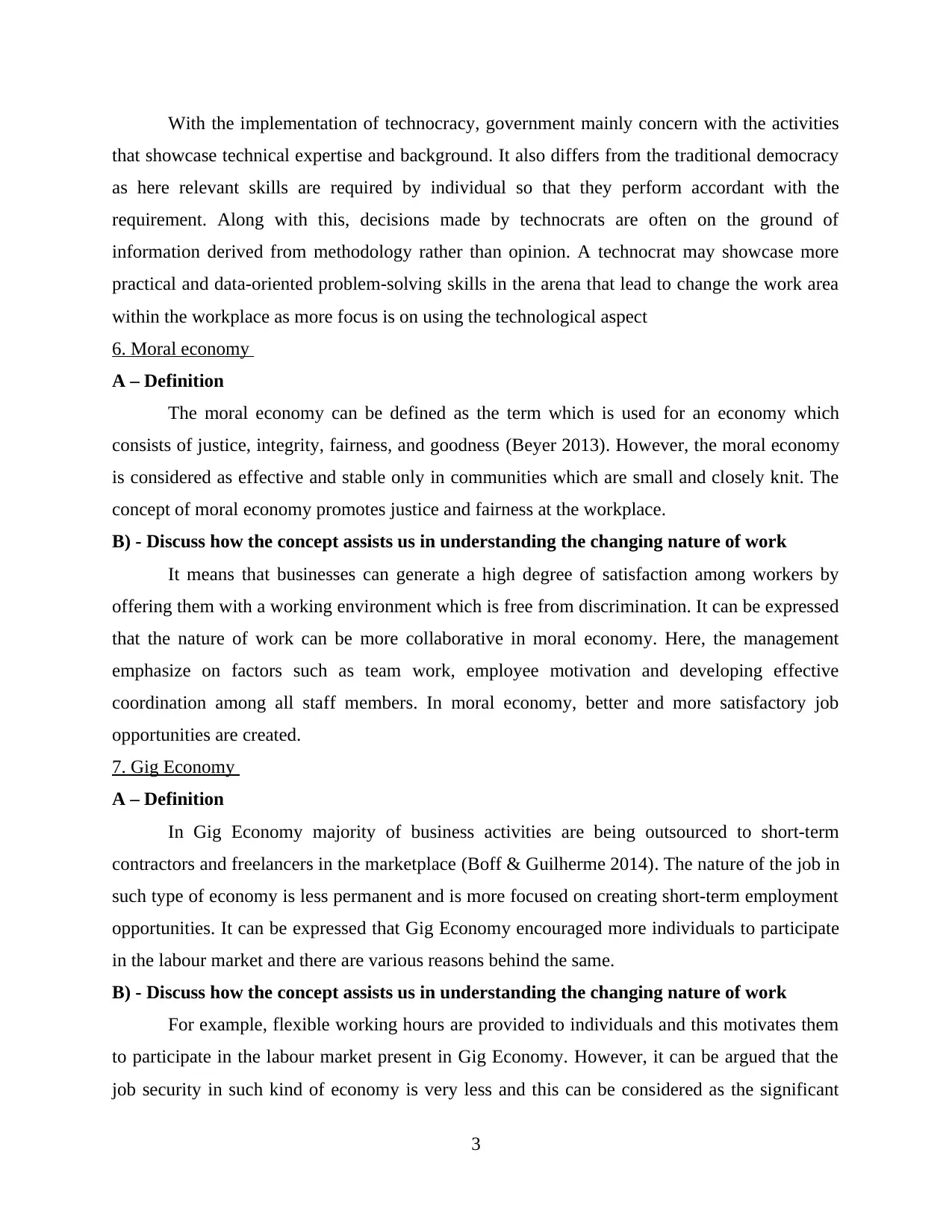
With the implementation of technocracy, government mainly concern with the activities
that showcase technical expertise and background. It also differs from the traditional democracy
as here relevant skills are required by individual so that they perform accordant with the
requirement. Along with this, decisions made by technocrats are often on the ground of
information derived from methodology rather than opinion. A technocrat may showcase more
practical and data-oriented problem-solving skills in the arena that lead to change the work area
within the workplace as more focus is on using the technological aspect
6. Moral economy
A – Definition
The moral economy can be defined as the term which is used for an economy which
consists of justice, integrity, fairness, and goodness (Beyer 2013). However, the moral economy
is considered as effective and stable only in communities which are small and closely knit. The
concept of moral economy promotes justice and fairness at the workplace.
B) - Discuss how the concept assists us in understanding the changing nature of work
It means that businesses can generate a high degree of satisfaction among workers by
offering them with a working environment which is free from discrimination. It can be expressed
that the nature of work can be more collaborative in moral economy. Here, the management
emphasize on factors such as team work, employee motivation and developing effective
coordination among all staff members. In moral economy, better and more satisfactory job
opportunities are created.
7. Gig Economy
A – Definition
In Gig Economy majority of business activities are being outsourced to short-term
contractors and freelancers in the marketplace (Boff & Guilherme 2014). The nature of the job in
such type of economy is less permanent and is more focused on creating short-term employment
opportunities. It can be expressed that Gig Economy encouraged more individuals to participate
in the labour market and there are various reasons behind the same.
B) - Discuss how the concept assists us in understanding the changing nature of work
For example, flexible working hours are provided to individuals and this motivates them
to participate in the labour market present in Gig Economy. However, it can be argued that the
job security in such kind of economy is very less and this can be considered as the significant
3
that showcase technical expertise and background. It also differs from the traditional democracy
as here relevant skills are required by individual so that they perform accordant with the
requirement. Along with this, decisions made by technocrats are often on the ground of
information derived from methodology rather than opinion. A technocrat may showcase more
practical and data-oriented problem-solving skills in the arena that lead to change the work area
within the workplace as more focus is on using the technological aspect
6. Moral economy
A – Definition
The moral economy can be defined as the term which is used for an economy which
consists of justice, integrity, fairness, and goodness (Beyer 2013). However, the moral economy
is considered as effective and stable only in communities which are small and closely knit. The
concept of moral economy promotes justice and fairness at the workplace.
B) - Discuss how the concept assists us in understanding the changing nature of work
It means that businesses can generate a high degree of satisfaction among workers by
offering them with a working environment which is free from discrimination. It can be expressed
that the nature of work can be more collaborative in moral economy. Here, the management
emphasize on factors such as team work, employee motivation and developing effective
coordination among all staff members. In moral economy, better and more satisfactory job
opportunities are created.
7. Gig Economy
A – Definition
In Gig Economy majority of business activities are being outsourced to short-term
contractors and freelancers in the marketplace (Boff & Guilherme 2014). The nature of the job in
such type of economy is less permanent and is more focused on creating short-term employment
opportunities. It can be expressed that Gig Economy encouraged more individuals to participate
in the labour market and there are various reasons behind the same.
B) - Discuss how the concept assists us in understanding the changing nature of work
For example, flexible working hours are provided to individuals and this motivates them
to participate in the labour market present in Gig Economy. However, it can be argued that the
job security in such kind of economy is very less and this can be considered as the significant
3
⊘ This is a preview!⊘
Do you want full access?
Subscribe today to unlock all pages.

Trusted by 1+ million students worldwide
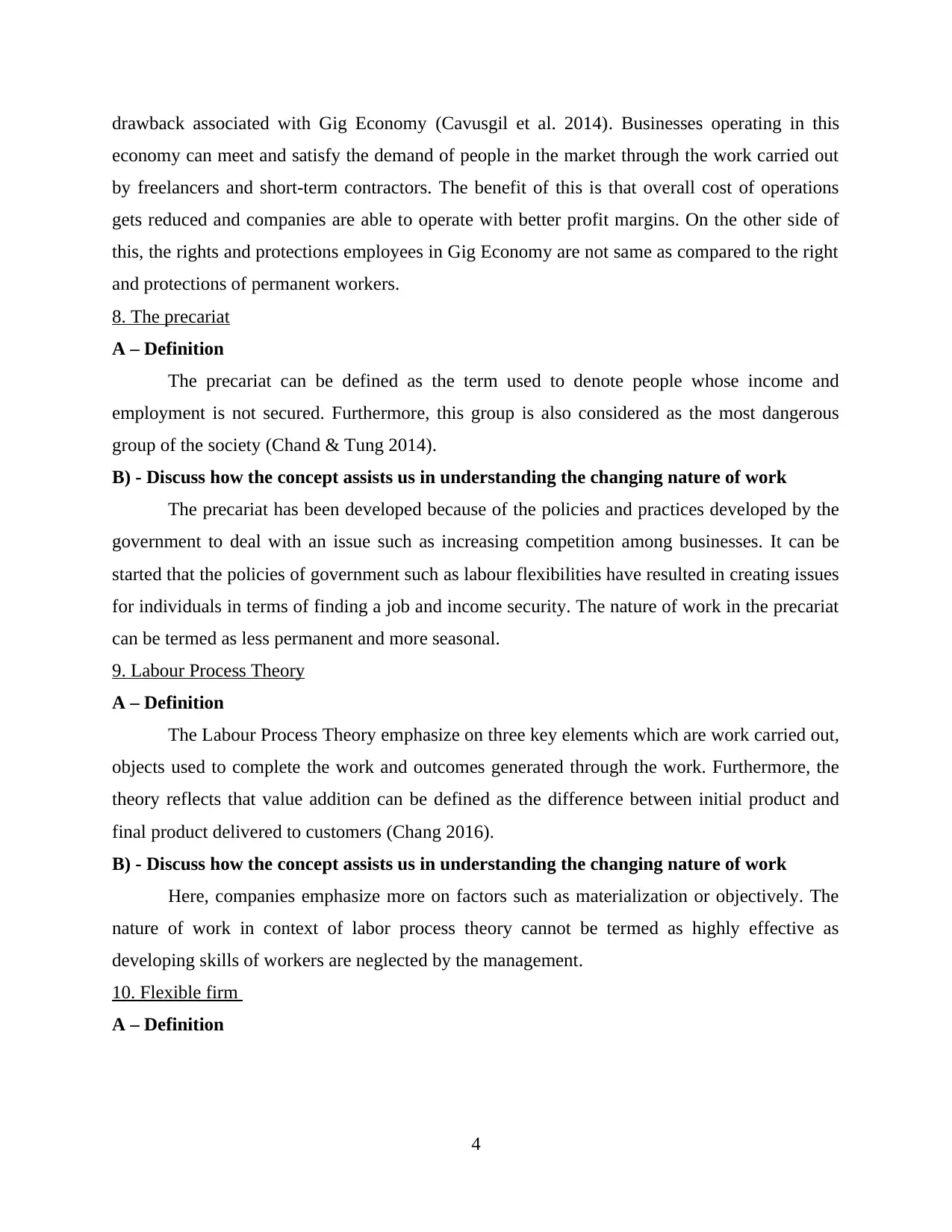
drawback associated with Gig Economy (Cavusgil et al. 2014). Businesses operating in this
economy can meet and satisfy the demand of people in the market through the work carried out
by freelancers and short-term contractors. The benefit of this is that overall cost of operations
gets reduced and companies are able to operate with better profit margins. On the other side of
this, the rights and protections employees in Gig Economy are not same as compared to the right
and protections of permanent workers.
8. The precariat
A – Definition
The precariat can be defined as the term used to denote people whose income and
employment is not secured. Furthermore, this group is also considered as the most dangerous
group of the society (Chand & Tung 2014).
B) - Discuss how the concept assists us in understanding the changing nature of work
The precariat has been developed because of the policies and practices developed by the
government to deal with an issue such as increasing competition among businesses. It can be
started that the policies of government such as labour flexibilities have resulted in creating issues
for individuals in terms of finding a job and income security. The nature of work in the precariat
can be termed as less permanent and more seasonal.
9. Labour Process Theory
A – Definition
The Labour Process Theory emphasize on three key elements which are work carried out,
objects used to complete the work and outcomes generated through the work. Furthermore, the
theory reflects that value addition can be defined as the difference between initial product and
final product delivered to customers (Chang 2016).
B) - Discuss how the concept assists us in understanding the changing nature of work
Here, companies emphasize more on factors such as materialization or objectively. The
nature of work in context of labor process theory cannot be termed as highly effective as
developing skills of workers are neglected by the management.
10. Flexible firm
A – Definition
4
economy can meet and satisfy the demand of people in the market through the work carried out
by freelancers and short-term contractors. The benefit of this is that overall cost of operations
gets reduced and companies are able to operate with better profit margins. On the other side of
this, the rights and protections employees in Gig Economy are not same as compared to the right
and protections of permanent workers.
8. The precariat
A – Definition
The precariat can be defined as the term used to denote people whose income and
employment is not secured. Furthermore, this group is also considered as the most dangerous
group of the society (Chand & Tung 2014).
B) - Discuss how the concept assists us in understanding the changing nature of work
The precariat has been developed because of the policies and practices developed by the
government to deal with an issue such as increasing competition among businesses. It can be
started that the policies of government such as labour flexibilities have resulted in creating issues
for individuals in terms of finding a job and income security. The nature of work in the precariat
can be termed as less permanent and more seasonal.
9. Labour Process Theory
A – Definition
The Labour Process Theory emphasize on three key elements which are work carried out,
objects used to complete the work and outcomes generated through the work. Furthermore, the
theory reflects that value addition can be defined as the difference between initial product and
final product delivered to customers (Chang 2016).
B) - Discuss how the concept assists us in understanding the changing nature of work
Here, companies emphasize more on factors such as materialization or objectively. The
nature of work in context of labor process theory cannot be termed as highly effective as
developing skills of workers are neglected by the management.
10. Flexible firm
A – Definition
4
Paraphrase This Document
Need a fresh take? Get an instant paraphrase of this document with our AI Paraphraser
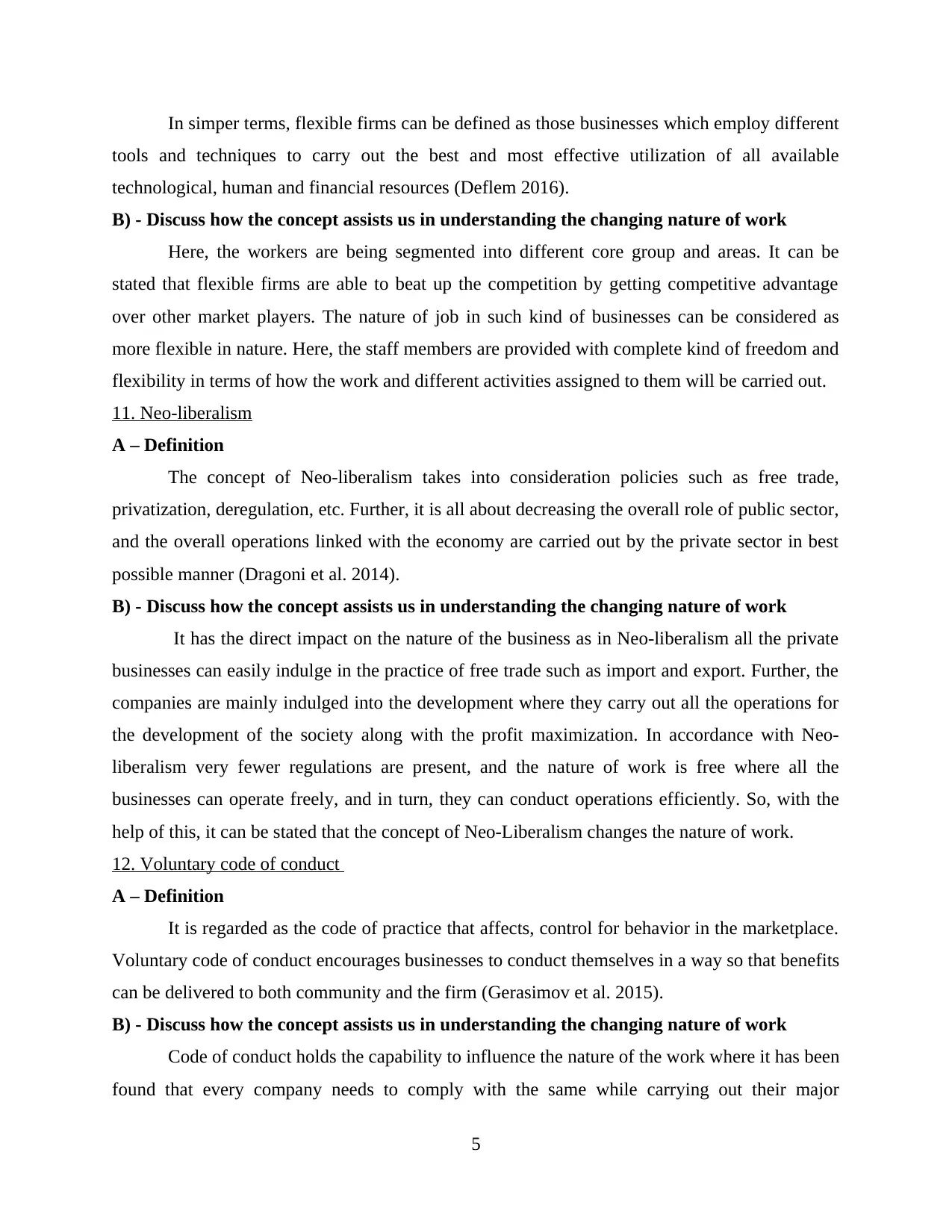
In simper terms, flexible firms can be defined as those businesses which employ different
tools and techniques to carry out the best and most effective utilization of all available
technological, human and financial resources (Deflem 2016).
B) - Discuss how the concept assists us in understanding the changing nature of work
Here, the workers are being segmented into different core group and areas. It can be
stated that flexible firms are able to beat up the competition by getting competitive advantage
over other market players. The nature of job in such kind of businesses can be considered as
more flexible in nature. Here, the staff members are provided with complete kind of freedom and
flexibility in terms of how the work and different activities assigned to them will be carried out.
11. Neo-liberalism
A – Definition
The concept of Neo-liberalism takes into consideration policies such as free trade,
privatization, deregulation, etc. Further, it is all about decreasing the overall role of public sector,
and the overall operations linked with the economy are carried out by the private sector in best
possible manner (Dragoni et al. 2014).
B) - Discuss how the concept assists us in understanding the changing nature of work
It has the direct impact on the nature of the business as in Neo-liberalism all the private
businesses can easily indulge in the practice of free trade such as import and export. Further, the
companies are mainly indulged into the development where they carry out all the operations for
the development of the society along with the profit maximization. In accordance with Neo-
liberalism very fewer regulations are present, and the nature of work is free where all the
businesses can operate freely, and in turn, they can conduct operations efficiently. So, with the
help of this, it can be stated that the concept of Neo-Liberalism changes the nature of work.
12. Voluntary code of conduct
A – Definition
It is regarded as the code of practice that affects, control for behavior in the marketplace.
Voluntary code of conduct encourages businesses to conduct themselves in a way so that benefits
can be delivered to both community and the firm (Gerasimov et al. 2015).
B) - Discuss how the concept assists us in understanding the changing nature of work
Code of conduct holds the capability to influence the nature of the work where it has been
found that every company needs to comply with the same while carrying out their major
5
tools and techniques to carry out the best and most effective utilization of all available
technological, human and financial resources (Deflem 2016).
B) - Discuss how the concept assists us in understanding the changing nature of work
Here, the workers are being segmented into different core group and areas. It can be
stated that flexible firms are able to beat up the competition by getting competitive advantage
over other market players. The nature of job in such kind of businesses can be considered as
more flexible in nature. Here, the staff members are provided with complete kind of freedom and
flexibility in terms of how the work and different activities assigned to them will be carried out.
11. Neo-liberalism
A – Definition
The concept of Neo-liberalism takes into consideration policies such as free trade,
privatization, deregulation, etc. Further, it is all about decreasing the overall role of public sector,
and the overall operations linked with the economy are carried out by the private sector in best
possible manner (Dragoni et al. 2014).
B) - Discuss how the concept assists us in understanding the changing nature of work
It has the direct impact on the nature of the business as in Neo-liberalism all the private
businesses can easily indulge in the practice of free trade such as import and export. Further, the
companies are mainly indulged into the development where they carry out all the operations for
the development of the society along with the profit maximization. In accordance with Neo-
liberalism very fewer regulations are present, and the nature of work is free where all the
businesses can operate freely, and in turn, they can conduct operations efficiently. So, with the
help of this, it can be stated that the concept of Neo-Liberalism changes the nature of work.
12. Voluntary code of conduct
A – Definition
It is regarded as the code of practice that affects, control for behavior in the marketplace.
Voluntary code of conduct encourages businesses to conduct themselves in a way so that benefits
can be delivered to both community and the firm (Gerasimov et al. 2015).
B) - Discuss how the concept assists us in understanding the changing nature of work
Code of conduct holds the capability to influence the nature of the work where it has been
found that every company needs to comply with the same while carrying out their major
5
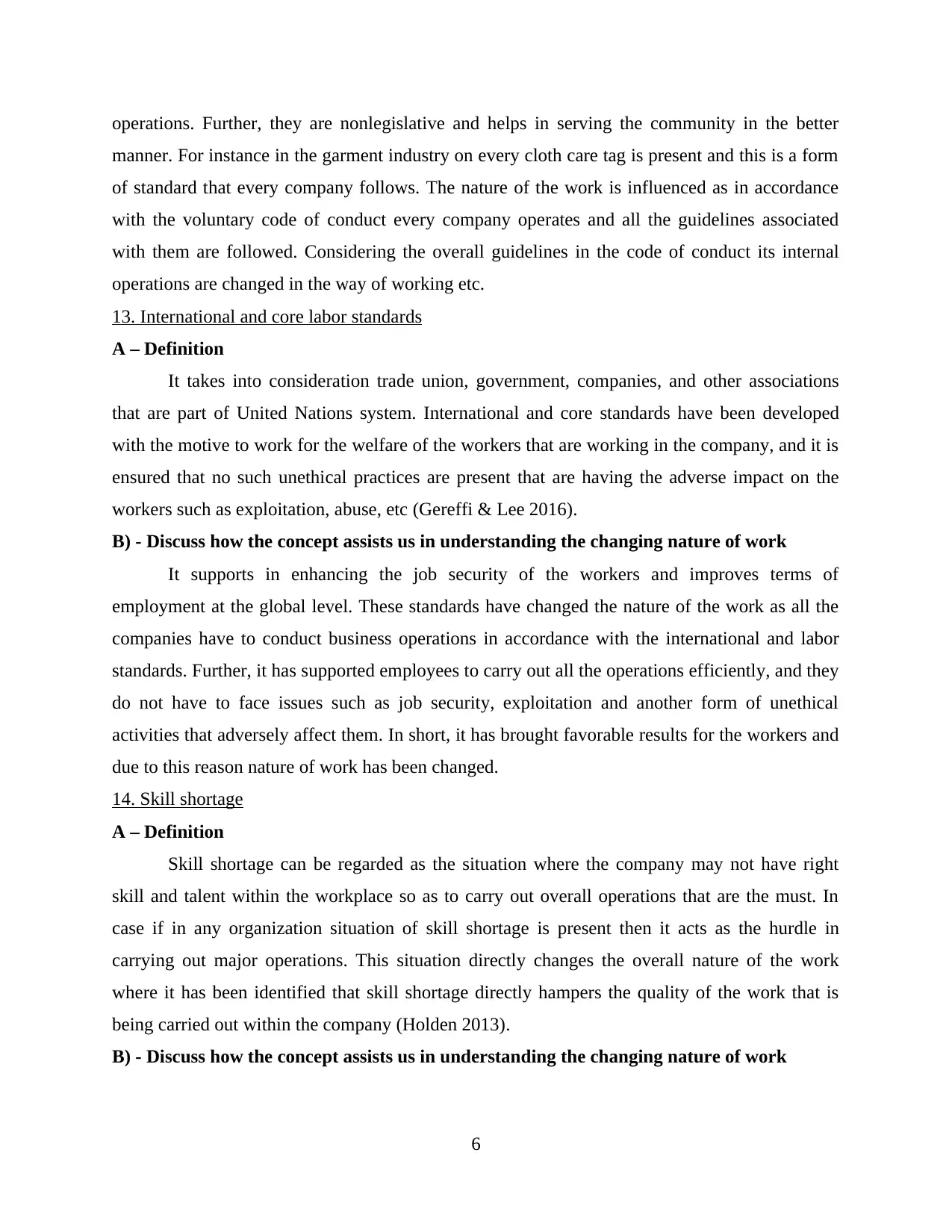
operations. Further, they are nonlegislative and helps in serving the community in the better
manner. For instance in the garment industry on every cloth care tag is present and this is a form
of standard that every company follows. The nature of the work is influenced as in accordance
with the voluntary code of conduct every company operates and all the guidelines associated
with them are followed. Considering the overall guidelines in the code of conduct its internal
operations are changed in the way of working etc.
13. International and core labor standards
A – Definition
It takes into consideration trade union, government, companies, and other associations
that are part of United Nations system. International and core standards have been developed
with the motive to work for the welfare of the workers that are working in the company, and it is
ensured that no such unethical practices are present that are having the adverse impact on the
workers such as exploitation, abuse, etc (Gereffi & Lee 2016).
B) - Discuss how the concept assists us in understanding the changing nature of work
It supports in enhancing the job security of the workers and improves terms of
employment at the global level. These standards have changed the nature of the work as all the
companies have to conduct business operations in accordance with the international and labor
standards. Further, it has supported employees to carry out all the operations efficiently, and they
do not have to face issues such as job security, exploitation and another form of unethical
activities that adversely affect them. In short, it has brought favorable results for the workers and
due to this reason nature of work has been changed.
14. Skill shortage
A – Definition
Skill shortage can be regarded as the situation where the company may not have right
skill and talent within the workplace so as to carry out overall operations that are the must. In
case if in any organization situation of skill shortage is present then it acts as the hurdle in
carrying out major operations. This situation directly changes the overall nature of the work
where it has been identified that skill shortage directly hampers the quality of the work that is
being carried out within the company (Holden 2013).
B) - Discuss how the concept assists us in understanding the changing nature of work
6
manner. For instance in the garment industry on every cloth care tag is present and this is a form
of standard that every company follows. The nature of the work is influenced as in accordance
with the voluntary code of conduct every company operates and all the guidelines associated
with them are followed. Considering the overall guidelines in the code of conduct its internal
operations are changed in the way of working etc.
13. International and core labor standards
A – Definition
It takes into consideration trade union, government, companies, and other associations
that are part of United Nations system. International and core standards have been developed
with the motive to work for the welfare of the workers that are working in the company, and it is
ensured that no such unethical practices are present that are having the adverse impact on the
workers such as exploitation, abuse, etc (Gereffi & Lee 2016).
B) - Discuss how the concept assists us in understanding the changing nature of work
It supports in enhancing the job security of the workers and improves terms of
employment at the global level. These standards have changed the nature of the work as all the
companies have to conduct business operations in accordance with the international and labor
standards. Further, it has supported employees to carry out all the operations efficiently, and they
do not have to face issues such as job security, exploitation and another form of unethical
activities that adversely affect them. In short, it has brought favorable results for the workers and
due to this reason nature of work has been changed.
14. Skill shortage
A – Definition
Skill shortage can be regarded as the situation where the company may not have right
skill and talent within the workplace so as to carry out overall operations that are the must. In
case if in any organization situation of skill shortage is present then it acts as the hurdle in
carrying out major operations. This situation directly changes the overall nature of the work
where it has been identified that skill shortage directly hampers the quality of the work that is
being carried out within the company (Holden 2013).
B) - Discuss how the concept assists us in understanding the changing nature of work
6
⊘ This is a preview!⊘
Do you want full access?
Subscribe today to unlock all pages.

Trusted by 1+ million students worldwide
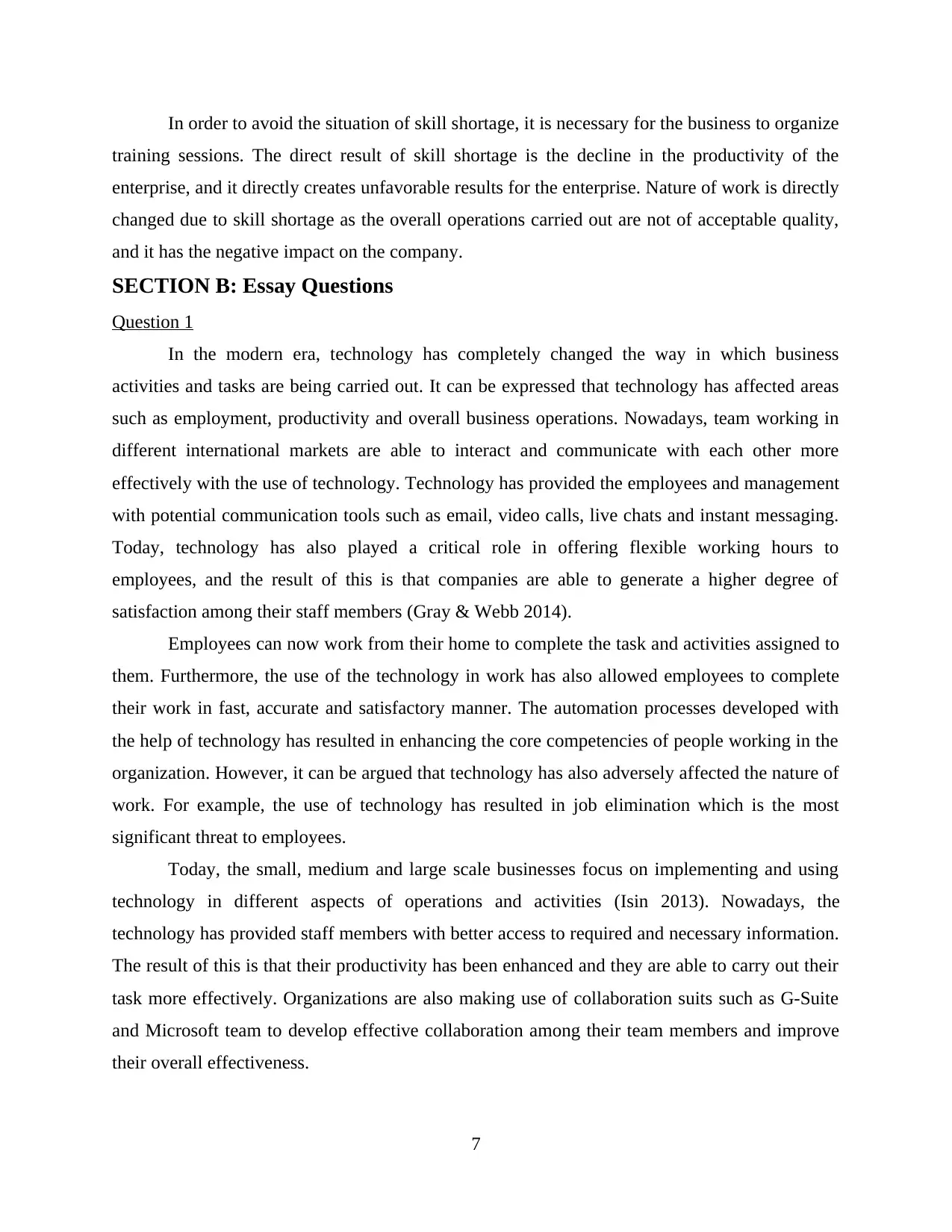
In order to avoid the situation of skill shortage, it is necessary for the business to organize
training sessions. The direct result of skill shortage is the decline in the productivity of the
enterprise, and it directly creates unfavorable results for the enterprise. Nature of work is directly
changed due to skill shortage as the overall operations carried out are not of acceptable quality,
and it has the negative impact on the company.
SECTION B: Essay Questions
Question 1
In the modern era, technology has completely changed the way in which business
activities and tasks are being carried out. It can be expressed that technology has affected areas
such as employment, productivity and overall business operations. Nowadays, team working in
different international markets are able to interact and communicate with each other more
effectively with the use of technology. Technology has provided the employees and management
with potential communication tools such as email, video calls, live chats and instant messaging.
Today, technology has also played a critical role in offering flexible working hours to
employees, and the result of this is that companies are able to generate a higher degree of
satisfaction among their staff members (Gray & Webb 2014).
Employees can now work from their home to complete the task and activities assigned to
them. Furthermore, the use of the technology in work has also allowed employees to complete
their work in fast, accurate and satisfactory manner. The automation processes developed with
the help of technology has resulted in enhancing the core competencies of people working in the
organization. However, it can be argued that technology has also adversely affected the nature of
work. For example, the use of technology has resulted in job elimination which is the most
significant threat to employees.
Today, the small, medium and large scale businesses focus on implementing and using
technology in different aspects of operations and activities (Isin 2013). Nowadays, the
technology has provided staff members with better access to required and necessary information.
The result of this is that their productivity has been enhanced and they are able to carry out their
task more effectively. Organizations are also making use of collaboration suits such as G-Suite
and Microsoft team to develop effective collaboration among their team members and improve
their overall effectiveness.
7
training sessions. The direct result of skill shortage is the decline in the productivity of the
enterprise, and it directly creates unfavorable results for the enterprise. Nature of work is directly
changed due to skill shortage as the overall operations carried out are not of acceptable quality,
and it has the negative impact on the company.
SECTION B: Essay Questions
Question 1
In the modern era, technology has completely changed the way in which business
activities and tasks are being carried out. It can be expressed that technology has affected areas
such as employment, productivity and overall business operations. Nowadays, team working in
different international markets are able to interact and communicate with each other more
effectively with the use of technology. Technology has provided the employees and management
with potential communication tools such as email, video calls, live chats and instant messaging.
Today, technology has also played a critical role in offering flexible working hours to
employees, and the result of this is that companies are able to generate a higher degree of
satisfaction among their staff members (Gray & Webb 2014).
Employees can now work from their home to complete the task and activities assigned to
them. Furthermore, the use of the technology in work has also allowed employees to complete
their work in fast, accurate and satisfactory manner. The automation processes developed with
the help of technology has resulted in enhancing the core competencies of people working in the
organization. However, it can be argued that technology has also adversely affected the nature of
work. For example, the use of technology has resulted in job elimination which is the most
significant threat to employees.
Today, the small, medium and large scale businesses focus on implementing and using
technology in different aspects of operations and activities (Isin 2013). Nowadays, the
technology has provided staff members with better access to required and necessary information.
The result of this is that their productivity has been enhanced and they are able to carry out their
task more effectively. Organizations are also making use of collaboration suits such as G-Suite
and Microsoft team to develop effective collaboration among their team members and improve
their overall effectiveness.
7
Paraphrase This Document
Need a fresh take? Get an instant paraphrase of this document with our AI Paraphraser
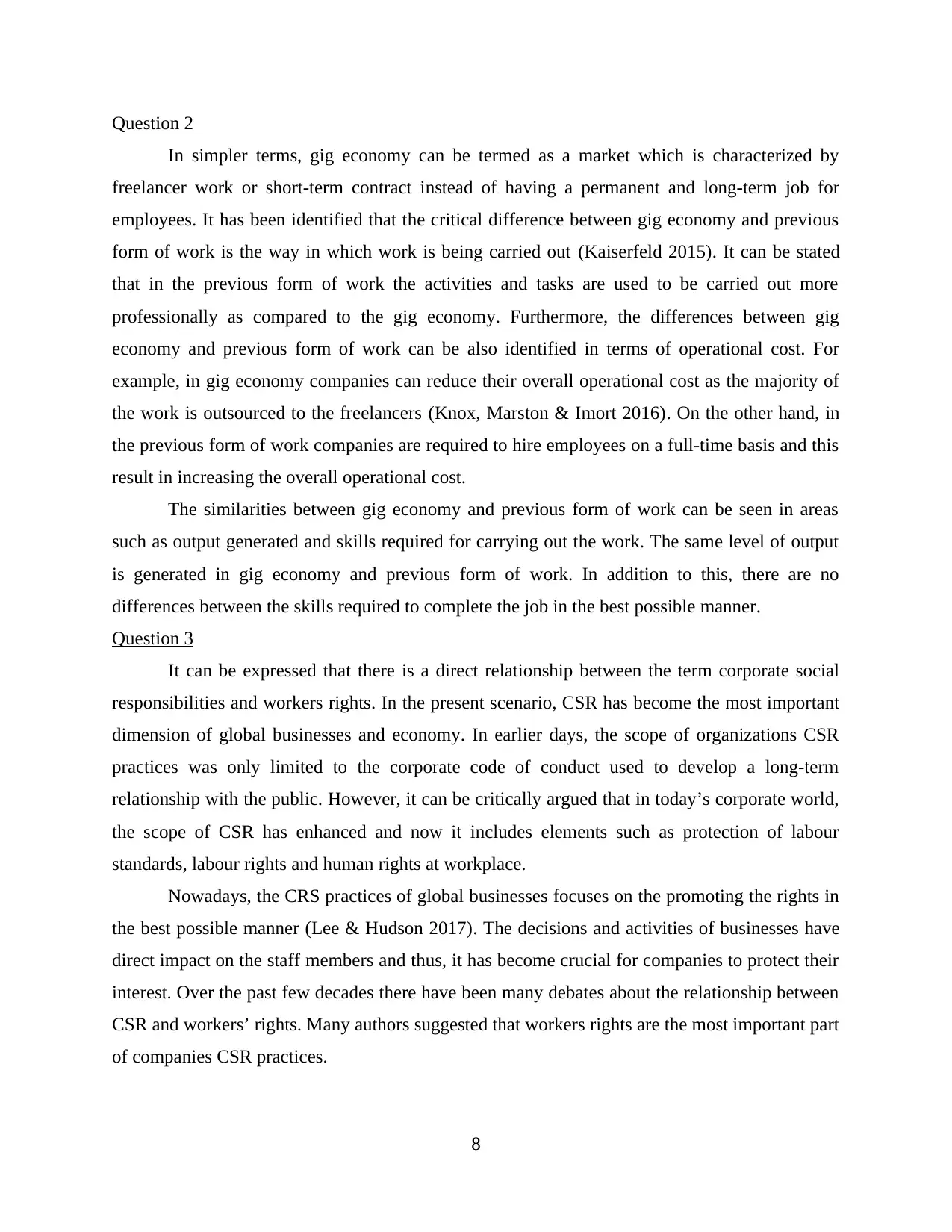
Question 2
In simpler terms, gig economy can be termed as a market which is characterized by
freelancer work or short-term contract instead of having a permanent and long-term job for
employees. It has been identified that the critical difference between gig economy and previous
form of work is the way in which work is being carried out (Kaiserfeld 2015). It can be stated
that in the previous form of work the activities and tasks are used to be carried out more
professionally as compared to the gig economy. Furthermore, the differences between gig
economy and previous form of work can be also identified in terms of operational cost. For
example, in gig economy companies can reduce their overall operational cost as the majority of
the work is outsourced to the freelancers (Knox, Marston & Imort 2016). On the other hand, in
the previous form of work companies are required to hire employees on a full-time basis and this
result in increasing the overall operational cost.
The similarities between gig economy and previous form of work can be seen in areas
such as output generated and skills required for carrying out the work. The same level of output
is generated in gig economy and previous form of work. In addition to this, there are no
differences between the skills required to complete the job in the best possible manner.
Question 3
It can be expressed that there is a direct relationship between the term corporate social
responsibilities and workers rights. In the present scenario, CSR has become the most important
dimension of global businesses and economy. In earlier days, the scope of organizations CSR
practices was only limited to the corporate code of conduct used to develop a long-term
relationship with the public. However, it can be critically argued that in today’s corporate world,
the scope of CSR has enhanced and now it includes elements such as protection of labour
standards, labour rights and human rights at workplace.
Nowadays, the CRS practices of global businesses focuses on the promoting the rights in
the best possible manner (Lee & Hudson 2017). The decisions and activities of businesses have
direct impact on the staff members and thus, it has become crucial for companies to protect their
interest. Over the past few decades there have been many debates about the relationship between
CSR and workers’ rights. Many authors suggested that workers rights are the most important part
of companies CSR practices.
8
In simpler terms, gig economy can be termed as a market which is characterized by
freelancer work or short-term contract instead of having a permanent and long-term job for
employees. It has been identified that the critical difference between gig economy and previous
form of work is the way in which work is being carried out (Kaiserfeld 2015). It can be stated
that in the previous form of work the activities and tasks are used to be carried out more
professionally as compared to the gig economy. Furthermore, the differences between gig
economy and previous form of work can be also identified in terms of operational cost. For
example, in gig economy companies can reduce their overall operational cost as the majority of
the work is outsourced to the freelancers (Knox, Marston & Imort 2016). On the other hand, in
the previous form of work companies are required to hire employees on a full-time basis and this
result in increasing the overall operational cost.
The similarities between gig economy and previous form of work can be seen in areas
such as output generated and skills required for carrying out the work. The same level of output
is generated in gig economy and previous form of work. In addition to this, there are no
differences between the skills required to complete the job in the best possible manner.
Question 3
It can be expressed that there is a direct relationship between the term corporate social
responsibilities and workers rights. In the present scenario, CSR has become the most important
dimension of global businesses and economy. In earlier days, the scope of organizations CSR
practices was only limited to the corporate code of conduct used to develop a long-term
relationship with the public. However, it can be critically argued that in today’s corporate world,
the scope of CSR has enhanced and now it includes elements such as protection of labour
standards, labour rights and human rights at workplace.
Nowadays, the CRS practices of global businesses focuses on the promoting the rights in
the best possible manner (Lee & Hudson 2017). The decisions and activities of businesses have
direct impact on the staff members and thus, it has become crucial for companies to protect their
interest. Over the past few decades there have been many debates about the relationship between
CSR and workers’ rights. Many authors suggested that workers rights are the most important part
of companies CSR practices.
8
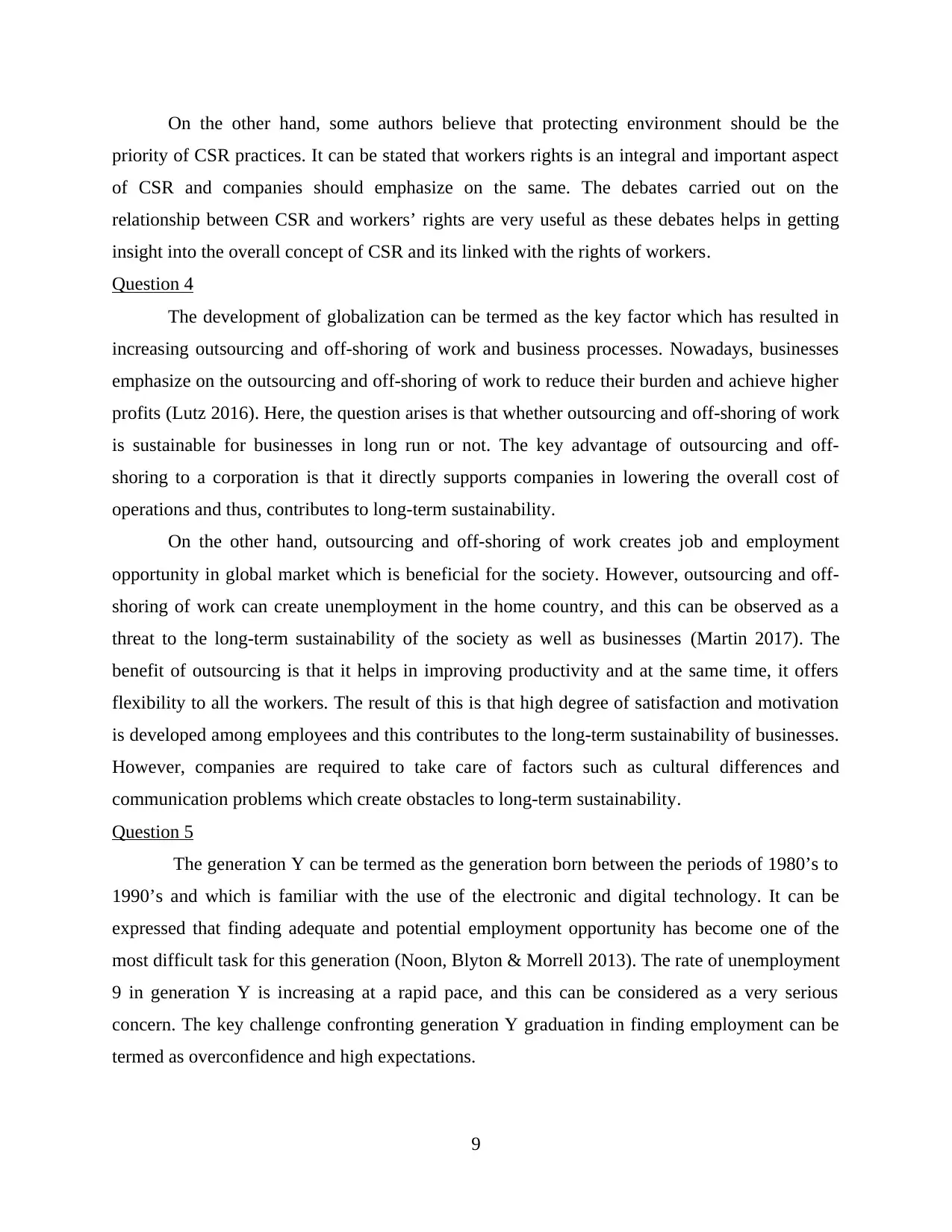
On the other hand, some authors believe that protecting environment should be the
priority of CSR practices. It can be stated that workers rights is an integral and important aspect
of CSR and companies should emphasize on the same. The debates carried out on the
relationship between CSR and workers’ rights are very useful as these debates helps in getting
insight into the overall concept of CSR and its linked with the rights of workers.
Question 4
The development of globalization can be termed as the key factor which has resulted in
increasing outsourcing and off-shoring of work and business processes. Nowadays, businesses
emphasize on the outsourcing and off-shoring of work to reduce their burden and achieve higher
profits (Lutz 2016). Here, the question arises is that whether outsourcing and off-shoring of work
is sustainable for businesses in long run or not. The key advantage of outsourcing and off-
shoring to a corporation is that it directly supports companies in lowering the overall cost of
operations and thus, contributes to long-term sustainability.
On the other hand, outsourcing and off-shoring of work creates job and employment
opportunity in global market which is beneficial for the society. However, outsourcing and off-
shoring of work can create unemployment in the home country, and this can be observed as a
threat to the long-term sustainability of the society as well as businesses (Martin 2017). The
benefit of outsourcing is that it helps in improving productivity and at the same time, it offers
flexibility to all the workers. The result of this is that high degree of satisfaction and motivation
is developed among employees and this contributes to the long-term sustainability of businesses.
However, companies are required to take care of factors such as cultural differences and
communication problems which create obstacles to long-term sustainability.
Question 5
The generation Y can be termed as the generation born between the periods of 1980’s to
1990’s and which is familiar with the use of the electronic and digital technology. It can be
expressed that finding adequate and potential employment opportunity has become one of the
most difficult task for this generation (Noon, Blyton & Morrell 2013). The rate of unemployment
9 in generation Y is increasing at a rapid pace, and this can be considered as a very serious
concern. The key challenge confronting generation Y graduation in finding employment can be
termed as overconfidence and high expectations.
9
priority of CSR practices. It can be stated that workers rights is an integral and important aspect
of CSR and companies should emphasize on the same. The debates carried out on the
relationship between CSR and workers’ rights are very useful as these debates helps in getting
insight into the overall concept of CSR and its linked with the rights of workers.
Question 4
The development of globalization can be termed as the key factor which has resulted in
increasing outsourcing and off-shoring of work and business processes. Nowadays, businesses
emphasize on the outsourcing and off-shoring of work to reduce their burden and achieve higher
profits (Lutz 2016). Here, the question arises is that whether outsourcing and off-shoring of work
is sustainable for businesses in long run or not. The key advantage of outsourcing and off-
shoring to a corporation is that it directly supports companies in lowering the overall cost of
operations and thus, contributes to long-term sustainability.
On the other hand, outsourcing and off-shoring of work creates job and employment
opportunity in global market which is beneficial for the society. However, outsourcing and off-
shoring of work can create unemployment in the home country, and this can be observed as a
threat to the long-term sustainability of the society as well as businesses (Martin 2017). The
benefit of outsourcing is that it helps in improving productivity and at the same time, it offers
flexibility to all the workers. The result of this is that high degree of satisfaction and motivation
is developed among employees and this contributes to the long-term sustainability of businesses.
However, companies are required to take care of factors such as cultural differences and
communication problems which create obstacles to long-term sustainability.
Question 5
The generation Y can be termed as the generation born between the periods of 1980’s to
1990’s and which is familiar with the use of the electronic and digital technology. It can be
expressed that finding adequate and potential employment opportunity has become one of the
most difficult task for this generation (Noon, Blyton & Morrell 2013). The rate of unemployment
9 in generation Y is increasing at a rapid pace, and this can be considered as a very serious
concern. The key challenge confronting generation Y graduation in finding employment can be
termed as overconfidence and high expectations.
9
⊘ This is a preview!⊘
Do you want full access?
Subscribe today to unlock all pages.

Trusted by 1+ million students worldwide
1 out of 18
Related Documents
Your All-in-One AI-Powered Toolkit for Academic Success.
+13062052269
info@desklib.com
Available 24*7 on WhatsApp / Email
![[object Object]](/_next/static/media/star-bottom.7253800d.svg)
Unlock your academic potential
Copyright © 2020–2026 A2Z Services. All Rights Reserved. Developed and managed by ZUCOL.





